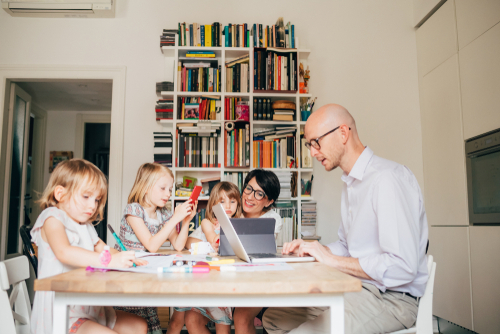Many parents have expressed concerns about our country’s educational system. In recent years, there have been school shootings, bombings, and reports of child molestation. Parents no longer feel that their children are safe in school. While the subject may be debatable, many have decided to teach their children at home. Unfortunately, parents may not know when or where to begin. It is important to become familiar with the rules and expectations of home-schooling.
What Exactly Is Home-Schooling?
Home-schooling is the option to officially teach your child from home. By law, children must receive a state-approved education. However, they are not required to leave their home to do so. Parents or guardians can instruct their child without the interference of a traditional educational program. The structure and curriculum depends on the parent and child. Although each state has its own guidelines, there is specific material that children are expected to learn. In order to qualify for a certain grade or earn a diploma, your child must be able to pass all standardized tests.When Should You Start?
A Parents Role in Homeschooling
Parents become teachers from the moment their children are born. They are responsible for teaching their babies how to talk, walk, and feed themselves. Children are notorious for their inquisitive nature, but some are not quite ready for the structure of a traditional classroom. Most parents are perfectly capable of continuing basic education at home. Of course, you are expected to formally report your intentions of home-schooling. The legal age for children to attend school is between the ages of 5 and 7 years old, depending on your state. Of course, parents are allowed to begin home-schooling as early as they like. So, an honest answer to this question is whenever you feel your child is ready. It will become clear when they are ready for more knowledge and responsibility. Besides, no one knows what your child is capable of more than you.
What Are The Benefits?
Although it requires a more hand-on approach than the traditional method, there are several benefits to home-schooling your child. Schools are becoming more crowded every year. This limits the amount of one-on-one time between teacher and student, which can be damaging for students with behavioral issues or learning disabilities. Home-schooling also allows parent an opportunity reinforce their personal beliefs and values. In today’s culture, religion and certain traditions are not permitted in public schools. One of the most valuable benefits, however, is the quality time you can spend with your child. Children spend more time with their teachers than family members. With home-schooling, parents will not miss the important milestones in their children’s lives.
Traditional Education
If your child is already receiving a traditional education, then it may take a bit of observation to determine the best time for a transition. Some people believe that an early introduction to a learning environment is more beneficial in the long run. However, there is no right or wrong time to begin teaching your child at home. The key is to ensure it is the best decision for you and your family. You can receive more advice and helpful tips at Home Schooling Ideas.
Related Resources:
